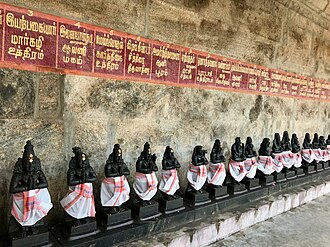Bhakti movement
Bhakti Movement was a Hindu religious movement that promoted the belief in and the love of a personal God. Originating in South India in the 7th century CE, it spread throughout the Indian subcontinent over the ensuing centuries, reaching its peak between the 15th and 17th centuries. The movement was characterized by its disregard for caste distinctions and its emphasis on devotion (Bhakti) as the means to attain Moksha (liberation from the cycle of rebirth). It played a crucial role in shaping the religious landscape of India, influencing not just Hinduism but also other religions such as Sikhism and Jainism.
Origins and Development
The Bhakti movement's roots are often traced back to the Tamil saints, known as the Alvars and Nayanars, who lived between the 6th and 9th centuries. These saints expressed their devotion to Vishnu and Shiva through passionate poetry and songs, setting the foundation for Bhakti literature and practice. The movement later spread to other parts of India, with saints such as Kabir, Ramananda, Tulsidas, Mirabai, and Guru Nanak playing pivotal roles in its expansion.
Philosophy and Teachings
The core philosophy of the Bhakti movement revolves around the unconditional love and devotion towards a personal god, which is seen as the path to salvation. This devotional sentiment transcends the traditional Vedic rituals and the caste system, advocating for a direct and personal relationship with the divine. The movement emphasized the importance of Kirtan (devotional singing), Nama Japa (repetition of God's name), and the company of saints and devotees (Satsang) as means to cultivate devotion.
Impact on Society
The Bhakti movement had a profound impact on Indian society and culture. It challenged the caste system by promoting the idea that all individuals, regardless of caste, have equal access to God. This inclusivity helped to foster a sense of unity and equality among its followers. The movement also contributed significantly to the development of regional languages and literature, as Bhakti poets wrote in the vernacular, making their spiritual messages accessible to a wider audience.
Legacy
The legacy of the Bhakti movement is evident in the continued popularity of its saints, their poetry, and the practices they advocated. It has influenced various aspects of Indian culture, including music, dance, and art. The movement's emphasis on devotion and the personal experience of the divine continues to resonate with millions of people, both in India and around the world.
See Also
Transform your life with W8MD's budget GLP-1 injections from $125.
W8MD offers a medical weight loss program to lose weight in Philadelphia. Our physician-supervised medical weight loss provides:
- Most insurances accepted or discounted self-pay rates. We will obtain insurance prior authorizations if needed.
- Generic GLP1 weight loss injections from $125 for the starting dose.
- Also offer prescription weight loss medications including Phentermine, Qsymia, Diethylpropion, Contrave etc.
NYC weight loss doctor appointments
Start your NYC weight loss journey today at our NYC medical weight loss and Philadelphia medical weight loss clinics.
- Call 718-946-5500 to lose weight in NYC or for medical weight loss in Philadelphia 215-676-2334.
- Tags:NYC medical weight loss, Philadelphia lose weight Zepbound NYC, Budget GLP1 weight loss injections, Wegovy Philadelphia, Wegovy NYC, Philadelphia medical weight loss, Brookly weight loss and Wegovy NYC
|
WikiMD's Wellness Encyclopedia |
| Let Food Be Thy Medicine Medicine Thy Food - Hippocrates |
Medical Disclaimer: WikiMD is not a substitute for professional medical advice. The information on WikiMD is provided as an information resource only, may be incorrect, outdated or misleading, and is not to be used or relied on for any diagnostic or treatment purposes. Please consult your health care provider before making any healthcare decisions or for guidance about a specific medical condition. WikiMD expressly disclaims responsibility, and shall have no liability, for any damages, loss, injury, or liability whatsoever suffered as a result of your reliance on the information contained in this site. By visiting this site you agree to the foregoing terms and conditions, which may from time to time be changed or supplemented by WikiMD. If you do not agree to the foregoing terms and conditions, you should not enter or use this site. See full disclaimer.
Credits:Most images are courtesy of Wikimedia commons, and templates, categories Wikipedia, licensed under CC BY SA or similar.
Contributors: Prab R. Tumpati, MD






